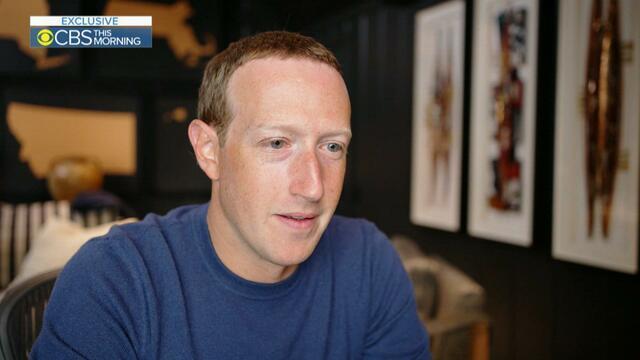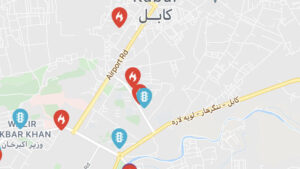Facebook CEO on enforcing office vaccine mandate: “Employees are required to be honest”

Facebook CEO on enforcing office vaccine mandate: “Employees are required to be honest”
Facebook and other social media companies are facing challenges in fighting vaccine misinformation and vaccine hesitancy while trying to plan a safe return to the office as the pandemic drags on.
“CBS This Morning” co-host Gayle King spoke exclusively with Facebook CEO and co-founder Mark Zuckerberg about the platform’s efforts to handle the issue of misinformation, as well as what Facebook is doing to protect its own employees amid the pandemic. One of the ways the company is keeping employees safe is by delaying plans to return to the office from this October to January 2022.
“I think the numbers that we’re seeing around this Delta variant with COVID are pretty concerning, right? They’re growing. And it just underscores I think the importance of you know, everyone getting vaccinated to help get this under control,” Zuckerberg said.
The company now requires anyone coming to work in its U.S. offices to be vaccinated. Zuckerberg said employees can work remotely if they are not vaccinated for now.
“Well, we’re going to allow people to work remotely. I also think that there are some health exemptions. But overall we want to make sure that our employee population, especially the people that are in the office, you know, in the open floor plan that we have, are both safe themselves and contributing to a safe community,” Zuckerberg said.
As for how they will verify employees’ vaccination status, Zuckerberg said while there is no “bulletproof solution” to this, employees are required to be honest to work for Facebook.
“If they lie to the company about any number of things then you know, that can cause serious issues. And we terminate people for that,” he said.
Zuckerberg said Facebook has been making an “unprecedented effort” to help people get vaccinated, while trying to fight COVID misinformation on the platform.
“This is a very important topic. And you know, Facebook is taking — I think it’s been an unprecedented effort to help encourage people to get vaccinated, to promote authoritative information about COVID and the vaccines, and to fight and take down misinformation,” he said.
“So, you know, millions of people have taken their first step to getting their vaccine through a vaccine finder tool that we’ve built at the top of Facebook and Instagram. We’ve put over the last year, basically, links to this coronavirus information hub, sharing authoritative information from government officials as well as trusted community leaders.”
He added that “billions of people have visited it.”
In terms of fighting misinformation, Zuckerberg said “we’ve taken down more than 18 million pieces of misinformation,” although he would not say how many Facebook users had seen such posts.
Since CBS News’ interview was taped, Facebook released updated numbers in their second quarter Community Standards Enforcement report, saying 20 million pieces of COVID-19 misinformation have been removed since the start of the pandemic through June.
Zuckerberg said that while they take down clear misinformation, posts about vaccine hesitancy are more difficult.
“To some degree, there are also different definitions that people have over what misinformation is,” he said. “What a lot of the stuff that’s actually the hardest for us to really address is not what I would call misinformation, but instead, another category that I would call hesitancy.”
For example, he said, “When you were first thinking about getting your vaccine, you probably had questions around, you know, which vaccine is the most effective for you and your family. And in some of these times, when people ask these questions, or — “Is this safe yet? Should I wait a while?“ That’s not misinformation. … But it’s certainly, you know, contributing to an environment where people are asking questions about the safety of vaccines. I don’t think we should ban it. But I do think that that’s a big part of the discourse at this point and certainly causes people to ask questions about whether they want to get vaccinated. So from a public health perspective, it may not be the most positive thing.”
He also disputed the idea of blaming social media for the vaccine misinformation problem.
“If you look around the world in different countries, right, different countries I think are doing better and worse on getting their citizens vaccinated. And, you know, the U.S. I think has a specific issue on this. People use Facebook and social media all across the world. So if this were primarily a question about social media, then I think you would see that being the effect in all of these countries where people use it,” he said.
“I think that there’s something that’s unique in our ecosystem here, whether it’s, you know, some of the political leaders and or some of the media figures,” Zuckerberg said. “So I don’t think pinning this on social media primarily is accurate.”
Zuckerberg also unveiled Facebook’s new “Horizon Workrooms” for virtual offices. See that part of the interview here.



